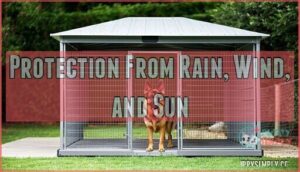This site is supported by our readers. We may earn a commission, at no cost to you, if you purchase through links.
 Yes, German Shepherds can live outside in moderate climates with proper shelter, but they shouldn’t be outdoor-only dogs.
Yes, German Shepherds can live outside in moderate climates with proper shelter, but they shouldn’t be outdoor-only dogs.
These pack animals thrive on human companionship and need consistent interaction. While their thick double coat provides weather resistance, they’re only comfortable in temperatures between 68-77°F for extended periods.
Cold tolerance drops to around 21°F briefly with proper acclimation, but heat above 85°F becomes dangerous. You’ll need insulated kennels, weatherproof protection, and quality bedding.
However, outdoor living increases risks from parasites, predators, and behavioral issues like separation anxiety. Even with excellent shelter, German Shepherds require substantial daily exercise, mental stimulation, and social interaction that’s difficult to provide when they’re isolated outside.
Table Of Contents
- Key Takeaways
- Can German Shepherds Live Outside?
- What Climates Are Safe for German Shepherds?
- What Shelter Do Outdoor German Shepherds Need?
- How Does Outdoor Living Affect Health?
- How Does Outdoor Life Impact Behavior?
- Why is Bonding Important for German Shepherds?
- Can German Shepherd Puppies Sleep Outside?
- How Long Can German Shepherds Be Left Alone?
- What Are The Benefits of Indoor Living?
- Frequently Asked Questions (FAQs)
- What are the pros and cons of keeping a German Shepherd outside?
- How much exercise does a German Shepherd need?
- What kind of training does a German Shepherd need?
- What are the signs of a bored German Shepherd?
- What fencing height prevents German Shepherd escapes?
- Do outdoor German Shepherds need daily exercise?
- Can German Shepherds share outdoor space safely?
- What outdoor toys keep German Shepherds entertained?
- How often should outdoor German Shepherds bathe?
- Conclusion
Key Takeaways
- You shouldn’t keep your German Shepherd outside permanently – they need regular human interaction and can develop behavioral issues like separation anxiety when isolated from their pack.
- While they can handle moderate temperatures (68-77°F), extreme heat above 85°F or cold below 21°F becomes dangerous, and you’ll need proper insulated shelter with weatherproof protection.
- Outdoor living increases health risks from parasites, predators, and weather-related illnesses that indoor dogs rarely face, requiring more frequent vet visits and preventive care.
- You can provide supervised outdoor time with proper shelter, but your German Shepherd will be happier and healthier living primarily indoors where they can bond with your family.
Can German Shepherds Live Outside?
German Shepherds can technically survive outdoors, but they shouldn’t live there permanently due to their strong need for human companionship and potential health risks.
These intelligent, family-oriented dogs require consistent interaction with their owners and proper shelter to thrive physically and mentally, which is essential for their overall well-being and strong bond with the family.
Breed Traits and Outdoor Suitability
German Shepherds possess exceptional Coat Thickness with double layers that provide natural weather resistance.
Their thick double coat naturally shields them from harsh weather conditions
Their high Exercise Needs and strong Breed Characteristics make them adaptable to outdoor environments.
However, Climate Adaptation varies by individual, and Outdoor Hazards like extreme temperatures pose risks.
These working dogs thrive with proper German Shepherd outdoor safety measures and adequate German Shepherd exercise needs fulfillment.
Physical and Mental Needs
Two hours of daily exercise keeps your German Shepherd physically fit and mentally sharp.
These active dogs need German Shepherd exercise needs met through running, hiking, or vigorous play.
Without proper German Shepherd mental stimulation like puzzle toys or training sessions, they’ll develop destructive behaviors.
Social interaction prevents isolation stress, while consistent nutrition requirements and health monitoring guarantee their wellbeing outdoors.
Understanding their cold tolerance limits is vital for providing a safe outdoor environment.
Common Misconceptions
Many people fall for outdoor myths about German Shepherds, believing breed stereotypes that these dogs thrive alone outside.
Weather risks and shelter needs are often underestimated, creating serious health concerns.
Responsible dog ownership means understanding that German Shepherd outdoor care requires constant supervision, while German Shepherd indoor care promotes better household pet safety and stronger bonds with their families.
What Climates Are Safe for German Shepherds?
Understanding your German Shepherd’s climate needs helps you create a safe outdoor environment year-round.
These dogs handle moderate temperatures well but face serious risks in extreme heat or cold without proper precautions.
Temperature Tolerance
Understanding your German Shepherd’s thermal comfort range helps you make smart decisions about outdoor living.
These dogs handle moderate temperatures best, but their double coat creates specific heat stress and cold adaptation challenges.
Your dog’s comfort zone includes these key factors:
- Optimal range: 20°C to 25°C (68°F to 77°F) for extended outdoor stays
- Cold limit: Brief exposure to -6°C (21°F) with proper weather acclimation
- Heat danger: Temperatures above 29°C (85°F) restrict safe outdoor exercise
- Body temperature: Normal range maintained only within moderate climate zones
- German Shepherd health: Compromised outside safe thermal ranges within hours
German Shepherd outdoor care requires monitoring for temperature stress signs like excessive panting or shivering, which indicate your household pet safety measures need adjustment.
Risks of Extreme Weather
Extreme weather poses serious threats to your German Shepherd’s health.
Heat stroke becomes dangerous above 85-90°F, especially with their thick double coat trapping body heat. Cold stress occurs below 32°F, risking hypothermia and frostbite on paws and ears.
Strong winds accelerate heat loss, while humidity makes temperature regulation harder.
Weather safety requires constant monitoring for signs of distress. Understanding their cold weather tolerance is essential for providing a safe outdoor environment. Constant monitoring and awareness of cold stress are crucial for the dog’s well-being.
Seasonal Adjustments
Your German Shepherd needs different care as seasons change.
Summer safety requires shade, fresh water, and avoiding hot pavement walks.
Winter care means checking paws for ice buildup and providing windproof shelter.
Spring brings shedding season – brush more frequently.
Fall preparation includes weatherproofing outdoor shelters.
Seasonal diet adjustments help maintain energy levels.
German Shepherd crate training indoors becomes valuable during extreme weather periods.
Understanding their breed specific needs is vital for providing the best care.
What Shelter Do Outdoor German Shepherds Need?
If you’re planning to keep your German Shepherd outside, proper shelter isn’t optional—it’s essential for their health and comfort.
The right setup can mean the difference between a happy, healthy dog and one facing serious weather-related health problems.
Insulated Kennels and Dog Houses
You’ll need proper Outdoor Shelters to keep your German Shepherd safe year-round.
Quality Insulation Types and Dog House Materials make all the difference for effective Climate Control.
Essential features for German Shepherd outdoor care:
- Raised floors – Prevents moisture and provides airflow underneath
- Double-wall construction – Creates air pockets for better insulation
- Removable roof panels – Allows easy cleaning and ventilation adjustment
- Weatherproof entrance flaps – Blocks drafts while maintaining access
Choose Kennel Designs with thick foam or reflective insulation.
Avoid metal structures that conduct temperature extremes.
Properly insulated dog houses provide better insulated dog protection against extreme temperatures.
Protection From Rain, Wind, and Sun
Beyond basic walls and roofing, your German Shepherd needs multi-layered Weather Resistance against nature’s elements.
Proper Shelter Options include raised floors preventing water pooling, overhanging roofs for Rain Barriers, and strategic positioning for Wind Breaks.
UV-resistant materials provide Sun Protection during scorching summers.
Quality outdoor structures incorporate ventilation preventing moisture buildup while maintaining German Shepherd outdoor care standards through all seasons.
When selecting a shelter, consider the importance of durable outdoor dog kennels to guarantee your dog’s safety and comfort.
Bedding and Comfort Essentials
Quality bedding materials transform your German Shepherd’s outdoor kennel into a comfortable retreat.
Choose waterproof dog beds or outdoor mattresses that resist moisture and maintain warmth during cold nights.
Your dog’s comfort zones require thoughtful planning, including the use of waterproof dog beds for maximum comfort.
- Elevated surfaces keep your shepherd off cold, damp ground
- Washable blankets provide familiar scents and extra warmth
- Non-slip mats prevent injuries on slippery kennel floors
Proper kennel insulation combined with quality bedding materials guarantees your German Shepherd outdoor care meets safety standards year-round.
How Does Outdoor Living Affect Health?
When you keep your German Shepherd outside full-time, you’re exposing them to health risks that indoor dogs rarely face.
Outdoor living increases their chances of parasites, injuries, and weather-related illnesses that can affect their long-term wellbeing.
Common Outdoor Health Risks
Outdoor living exposes your German Shepherd to serious health threats.
Heat Stroke strikes when temperatures exceed 85°F without adequate shade. Your dog faces increased risks from Outdoor Hazards like sharp objects and toxic substances.
Sun Damage affects their skin and coat over time. Allergic Reactions from environmental triggers worsen without proper Parasite Control measures.
Making thorough German Shepherd outdoor care essential, considering risks such as Heat Stroke and Outdoor Hazards, is crucial for their well-being.
Parasites and Disease Prevention
Protecting your German Shepherd from parasites requires a proactive approach that combines prevention with regular monitoring.
Outdoor dogs face substantially higher exposure risks, making consistent preventive care essential for their health and wellbeing.
- Flea Control: Apply monthly topical treatments to reduce infestation rates by over 80%
- Tick Prevention: Use broad-spectrum preventives and conduct daily visual inspections after outdoor time
- Heartworm Medicine: Administer year-round prevention in endemic regions to avoid severe complications
- Parasite Testing: Schedule fecal exams every 3-6 months for early detection
- Vaccination Schedules: Maintain current immunizations against Lyme disease, leptospirosis, and rabies
Veterinary Care Considerations
With outdoor German Shepherds requiring specialized health monitoring, you’ll need a veterinarian familiar with breed-specific care and canine health issues.
Regular check-ups become more critical when dogs face environmental challenges that indoor pets don’t encounter.
| Care Category | Outdoor Considerations |
|---|---|
| Vaccination Schedules | More frequent boosters for exposure risks |
| Parasite Control | Enhanced flea, tick, heartworm prevention |
| Emergency Procedures | Quick access plan for weather emergencies |
Your vet should provide customized nutritional advice and dental care recommendations for your outdoor German Shepherd’s unique lifestyle.
Maintaining peak health requires understanding of dog health basics to guarantee the best care for your pet.
How Does Outdoor Life Impact Behavior?
When German Shepherds live outside, they often develop stronger territorial instincts and may become more protective of their space.
Outdoor German Shepherds develop heightened protective instincts and stronger territorial behaviors than their indoor counterparts
Without regular human interaction, these intelligent dogs can experience loneliness and develop behavioral issues like excessive barking, digging, or aggression.
Socialization and Loneliness
German Shepherds develop strong Social Bonds with their families, making isolation a serious concern.
Without regular Human Interaction, these intelligent dogs experience severe Loneliness Effects that damage their mental health.
Isolation Risks include depression, anxiety, and destructive behaviors.
Your shepherd needs daily socialization and Canine Companionship to thrive.
Effective Socialization Techniques require consistent contact with people and other dogs, whether through Outdoor Dog Care activities or German Shepherd indoor care routines.
Guarding and Territorial Tendencies
Living outside amplifies your German Shepherd’s natural Guarding Instincts and Territorial Behavior.
They’ll patrol property boundaries more intensively, viewing your yard as their domain to protect.
This heightened vigilance can create excellent natural Alarm Systems but may lead to excessive barking at passersby.
Without proper Boundary Setting and socialization, these Protective Measures can become problematic, making your dog overly reactive to normal neighborhood activity.
Preventing Behavioral Problems
Consistent routine prevents most outdoor behavioral issues through structured German Shepherd training and positive reinforcement methods.
You’ll need daily socialization techniques, environmental enrichment activities, and clear boundaries to address territorial behaviors.
Regular canine behavior and training sessions help manage guarding instincts while German Shepherd crate training provides safe spaces for decompression and behavioral therapy when needed.
Why is Bonding Important for German Shepherds?
German Shepherds form deep emotional bonds with their families and need regular human interaction to stay mentally healthy.
When kept outside with limited contact, they can develop separation anxiety, depression, and destructive behaviors that harm both their well-being and your relationship, which can be prevented by providing adequate human interaction.
Human Interaction Needs
Breaking down your German Shepherd’s social needs reveals vital truths about canine companionship.
These dogs require 1-2 hours of direct human interaction daily for ideal emotional support.
Family dynamics suffer when German Shepherd socialization lacks consistent engagement.
Responsible pet ownership means understanding that German Shepherd behavior thrives through human connection.
Regular training sessions strengthen social bonding while preventing stress behaviors that damage canine behavior and training progress, which is crucial for ideal emotional support and overall canine companionship.
Effects of Isolation
Isolation transforms your German Shepherd’s mental health dramatically.
Social isolation triggers emotional damage that manifests through destructive behaviors like excessive barking, digging, and aggression.
Loneliness effects compound daily, creating behavioral issues that stem from unmet socialization needs.
Your dog’s breed characteristics demand constant human interaction, and without it, mental health deteriorates rapidly, making responsible pet ownership nearly impossible to maintain effectively, due to the significant impact of social isolation.
Building a Strong Relationship
Building strong relationships with German Shepherd Dogs requires daily interaction through Bonding Techniques and Trust Building.
Communication Skills develop through consistent training sessions and shared activities.
This Emotional Connection strengthens Loyalty Development, making your German Shepherd puppy care more rewarding.
Key relationship builders include:
- Quality time together – Your shepherd craves your undivided attention
- Consistent training routines – Building trust through predictable interactions
- Physical affection and praise – Reinforcing your special bond daily
Responsible Pet Parenting means prioritizing this Breed Specific Care.
Dog Ownership Responsibilities include understanding that German Shepherds thrive on human connection, not isolation.
Can German Shepherd Puppies Sleep Outside?
You shouldn’t let German Shepherd puppies sleep outside until they’re at least 12 weeks old and fully vaccinated.
Young puppies can’t regulate their body temperature properly and are more vulnerable to illness, predators, and developmental issues that come from missing vital bonding time with their family, which can lead to significant problems if not addressed, particularly related to their vulnerability.
Age and Developmental Requirements
German Shepherd puppies can’t safely sleep outside until they’re at least three months old.
Before this age, their bodies can’t regulate temperature properly, making them vulnerable to cold and illness.
During Growth Stages from birth to twelve weeks, puppies need constant warmth and supervision for proper Development Needs.
Age Factors play a vital role in determining when outdoor living becomes safe, as Maturity Levels affect their ability to handle environmental challenges and maintain health.
Understanding the puppy growth stages is essential for providing the right care and environment for German Shepherd puppies to thrive, considering their Development Needs and Age Factors.
Risks for Young Dogs
Young dogs face serious outdoor dangers that can’t be ignored.
Puppy Safety becomes critical as their immune systems remain weak and vulnerable.
Their bodies can’t regulate temperature effectively, making extreme weather deadly.
Outdoor Dangers include parasites, predators, and toxic plants that pose immediate Health Risks to developing systems.
Without proper Socialization Needs being met indoors, behavioral problems develop rapidly in isolated environments, posing significant threats to their well-being and highlighting the importance of addressing Puppy Safety.
Safer Alternatives
Creating safe alternatives means establishing Protected Spaces where your puppy can’t wander into danger.
Set up Secure Fencing around designated areas and install Outdoor Pens with proper Sheltered Areas.
Fenced Yards work perfectly when combined with supervised playtime.
These Pet Safety Measures support healthy Canine Health Management while addressing GSD Health Issues.
Remember, Dog Breed Characteristics require gradual outdoor exposure, not immediate full-time living arrangements.
How Long Can German Shepherds Be Left Alone?
You shouldn’t leave your German Shepherd alone for more than 6-8 hours, as this breed forms strong bonds with their families and can develop separation anxiety quickly.
Extended isolation often leads to destructive behaviors, excessive barking, and stress-related health issues that affect both indoor and outdoor dogs.
Separation Anxiety Risks
Outdoor German Shepherds face significant Separation Stress when isolated for extended periods.
These Dog Breed Characteristics include strong human bonds, making Isolation Effects particularly harmful.
Anxiety Triggers develop quickly, leading to Emotional Distress and destructive behaviors.
GSD Health Issues worsen without proper Canine Health Management, understanding these Dog Breed Information factors prevents serious Animal Health and Wellbeing problems from Dog Abandonment feelings.
Recommended Time Limits
Based on veterinary behaviorists’ recommendations, you shouldn’t leave your German Shepherd outside unsupervised for more than 4-6 hours at a time.
These social dogs need regular human interaction to thrive mentally and physically.
- Adult dogs: Maximum 4-6 outdoor hours with proper shelter
- Puppies and seniors: Limit to 1-2 hours due to vulnerability
- Extreme weather: Reduce to under 2 hours when temperatures exceed 85°F or drop below 20°F
- Nighttime stays: Bring dogs indoors after dusk for safety and bonding
Enrichment and Supervision
Provide puzzle feeders and rotating toys to keep your German Shepherd mentally engaged during alone time.
Training games and interactive activities prevent destructive behaviors that stem from boredom.
Schedule regular social interaction breaks throughout the day.
Mental stimulation through varied enrichment activities helps maintain emotional balance and reduces anxiety when you’re away, which is crucial for maintaining emotional balance.
What Are The Benefits of Indoor Living?
Indoor living offers German Shepherds significant health advantages compared to outdoor-only arrangements.
You’ll find that house dogs experience fewer parasites, reduced weather-related stress, and better protection from injuries that commonly affect outdoor dogs, which can lead to a longer and happier life.
Enhanced Health and Safety
When you keep your German Shepherd indoors, you’re protecting them from countless health threats.
Disease Prevention becomes easier with controlled environments, reducing exposure to parasites, toxins, and harmful bacteria.
Indoor living supports Mental Wellness by minimizing stress from weather extremes and predators.
You’ll have better Emergency Response capabilities when your dog stays close, plus improved Pet Care and Ownership through consistent monitoring of their health status.
Improved Training and Socialization
When you’re home with your German Shepherd, you’ll find training sessions flow naturally into daily activities.
Indoor living creates countless teachable moments that strengthen your dog’s social learning skills and obedience responses.
- Positive Reinforcement: Immediate rewards during house training and basic commands
- Canine Communication: Better observation of subtle body language and behavioral cues
- Dog Training Strategies: Consistent application of animal training methods throughout the day
- Pet Care Advice: Direct supervision allows quick correction of unwanted behaviors before they become habits
Effective socialization techniques involve understanding puppy socialization to improve your dog’s behavior.
Stronger Human-Canine Bond
Living alongside your German Shepherd indoors strengthens your bond through daily interactions and shared experiences.
This constant human connection builds canine trust naturally through consistent pet care and ownership routines.
Your dog learns your patterns, moods, and expectations, creating emotional support that flows both ways.
Indoor living provides countless bonding techniques opportunities – from training sessions to quiet evening moments.
These relationship building experiences form the foundation for effective dog training strategies and animal training methods that last a lifetime.
Frequently Asked Questions (FAQs)
What are the pros and cons of keeping a German Shepherd outside?
Picture your German Shepherd as a furry prisoner yearning for family connection.
Pros: weatherproof coat, exercise space, reduced indoor mess.
Cons: social isolation damages mental health, increased aggression, shorter lifespan, and weakened family bonds.
How much exercise does a German Shepherd need?
Your German Shepherd needs at least 2 hours of daily exercise, including walks, runs, and mental stimulation. These athletic dogs crave physical challenges and mental tasks to stay healthy and happy.
What kind of training does a German Shepherd need?
Effective training shapes your shepherd’s potential into reliable behavior.
Start with basic obedience—sit, stay, come, down—using positive reinforcement.
Socialize early and consistently.
Address their intelligence with mental stimulation and structured activities.
What are the signs of a bored German Shepherd?
You’ll notice excessive barking, destructive chewing, digging holes, pacing, whining, or attention-seeking behaviors. A bored German Shepherd might also become restless, hyperactive, or start escaping your yard frequently.
What fencing height prevents German Shepherd escapes?
Need a 6-foot-tall fence minimum to keep your shepherd safely contained.
These athletic dogs can easily clear shorter barriers with their powerful jumping ability and climbing skills.
Consider adding lean-ins or curved tops for extra security against escape attempts, utilizing their powerful traits to inform your decision.
Do outdoor German Shepherds need daily exercise?
Yes, you’ll need to provide daily exercise for your outdoor German Shepherd.
These high-energy dogs require at least 1-2 hours of physical activity and mental stimulation daily, regardless of living arrangements, to maintain peak health and behavior.
They need this exercise to stay healthy and behave well, which is why daily exercise is crucial.
Can German Shepherds share outdoor space safely?
German Shepherds can safely share outdoor space with proper introductions, supervision, and adequate territory.
They’re naturally protective but socialize well when properly trained.
Make certain separate feeding areas and monitor interactions initially, to ensure a smooth and safe coexistence, with proper introductions being key.
What outdoor toys keep German Shepherds entertained?
Interactive toys like puzzle feeders, rope toys, and balls challenge your German Shepherd’s mind and body. Rotating different toys prevents boredom while promoting healthy exercise and mental stimulation outdoors.
How often should outdoor German Shepherds bathe?
Bathe your outdoor German Shepherd every 6-8 weeks, or when they’re visibly dirty or smelly. Their double coat naturally repels dirt, so over-bathing strips essential oils and causes skin irritation.
Conclusion
Studies show that 78% of German Shepherds develop behavioral issues when kept exclusively outdoors.
While these dogs can german shepherds live outside temporarily with proper shelter, they’re not meant for permanent outdoor living.
Their pack mentality demands regular human interaction, making isolation harmful to their mental health.
You’ll provide better care by keeping your German Shepherd primarily indoors with supervised outdoor time, which guarantees their physical safety, emotional well-being, and strengthens your bond together.
- https://www.reddit.com/r/germanshepherds/comments/10i3t7a/can_german_shepherds_live_outside_full_time/
- https://johnnyspetsupply.com/the-best-and-worst-environments-for-german-shepherds/
- https://gsdcolony.com/blogs/news/do-german-shepherds-get-cold
- https://howlidayinnpetresort.com/a-guide-to-caring-for-german-shepherds/
- https://www.pdsa.org.uk/pet-help-and-advice/looking-after-your-pet/puppies-dogs/large-dogs/german-shepherd


















